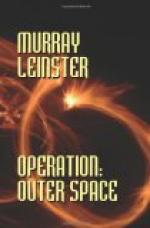Cochrane fumbled in his head.
“Oh, yes. I thought of that. But there is an advantage. The ship does work.”
“Because,” said Jones, triumphant again, “the field-effect depends partly on temperature! The gases in the rocket-blast are hot, away up in the thousands of degrees. They don’t have normal inertia, but they do have what you might call heat-inertia. They acquire a sort of fictitious mass when they get hot enough. So we carry along fuel that hasn’t any inertia to speak of when it’s cold, but acquires a lunatic sort of substitute for inertia when it’s genuinely hot. So a ship can travel in a Dabney field!”
“I’m relieved,” acknowledged Cochrane. “I thought you were about to tell me that we couldn’t lift off the moon, and I was going to ask how we got here.”
Jones smiled patiently.
“What I’m telling you now is that we can shoot rocket-blasts out of the Dabney field we make with the stern of the ship! Landing, we keep our fuel and the ship with next to no mass, and we shoot it out to where it does have mass, and the effect is practically the same as if we were pushing against something solid! And so we started off with fuel for maybe five or six landings and take-offs against Earth gravity. But with this new trick, we’ve got fuel for a couple of hundred!”
“Ah!” said Cochrane mildly. “This is the first thing you’ve said that meant anything to me. Congratulations! What comes next?”
“I thought you’d be pleased,” said Jones. “What I’m really telling you is that now we’ve got fuel enough to reach the Milky Way.”
“Let’s not,” suggested Cochrane, “and say we did! You’ve got a new star picked out to travel to?”
Jones shrugged his shoulders. In him, the gesture indicated practically hysterical frustration. But he said:
“Yes. Twenty-one light-years. Back on Earth they’re anxious for us to check on sol-type suns and Earth-type planets.”
“For once,” said Cochrane, “I am one with the great scientific minds. Let’s go over.”
He made his way to the circular stairway leading down to the main saloon. On his clumsy way across the saloon floor to the communicator, he felt the peculiar sensation of the booster-current, which should have been a sound, but wasn’t. It was the sensation which had preceded the preposterous leap of the space-ship away from Luna, when in a heart-beat of time all stars looked like streaks of light, and the ship traveled nearly two light-centuries.
Sunshine blinked, and then shone again in the ports around the saloon walls. The second shining came from a different direction—as if somebody had switched off one exterior light and turned on another—and at a different angle to the floor.
Cochrane reached the communicator. He felt no weight. He strapped himself into the chair. He switched on the vision-phone which sent radiation along the field to a balloon two hundred odd light-years from Earth—that was the balloon near the glacier planet—and then switched to the field traveling to a second balloon then the last hundred seventy-odd light-years back to the moon, and then from Luna City down to Earth.




